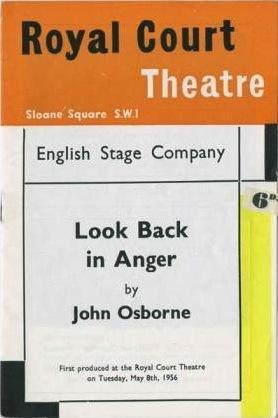On this day in 1956, Look Back in Anger by 27-year-old John Osborne opened at the Royal Court Theatre. It was the third play staged by George Devine’s English Stage Company, and it remains a landmark in English writing.
It was not, however, to everybody’s taste.
Milton Shulman, writing in the London Evening Standard, found the play "A self-pitying snivel". In the Daily Mail the setting was described as "unspeakably dirty and squalid.
Playwright Alan Sillitoe once wrote," Osborne didn't contribute to British theatre; he set off a landmine and blew most of it up."
The opinion that made the play appeared the following Sunday in The Observer. Kenneth Tynan’s review ended with the famous line, “I doubt if I could love anyone who did not wish to see Look Back in Anger." Here’s the full review…

'They are scum', was Mr Maugham's famous verdict on the class of State-aided university students to which Kingsley Amis's Lucky Jim belongs; and since Mr Maugham seldom says anything controversial or uncertain of wise acceptance, his opinion must clearly be that of many. Those who share it had better stay well away from John Osborne's Look Back in Anger (Royal Court) which is all scum and a mile wide.
Its hero, a provincial graduate who runs a sweet-stall, has already been summed-up in print as 'a young pup' and it is not hard to see why. What with his flair for introspection, his gift for ribald parody, his excoriating candour, his contempt for 'phoneyness', his weakness for soliloquy and his desperate conviction that the time is out of joint, Jimmy Porter is the completest young pup in our literature since Hamlet, Prince of Denmark. His wife, whose Anglo-Indian parents resent him, is persuaded by an actress friend to leave him; Jimmy's prompt response is to go to bed with the actress. Mr Osborne's picture of a certain kind of modern marriage is hilariously accurate; he shows us two attractive young animals engaged in competitive martyrdom, each with its teeth sunk deep in the other's neck, and each reluctant to break the clinch for fear of bleeding to death.
The fact that he writes with charity has led many critics into the trap of supposing that Mr Osborne's sympathies are wholly with Jimmy. Nothing could be more false. Jimmy is simply and abundantly alive; that rarest of dramatic phenomena, the act of original creation, has taken place; and those who carp were better silent. Is Jimmy's anger justified? Why doesn't he do something? These questions might be relevant if the character had failed to come to life in the presence of such evident and blazing vitality. I marvel at the pedantry that could ask them. There will be time enough to debate Mr Osborne's moral position when he has written a few more plays. In the present one he certainly goes off the deep end, but I cannot regard this as a vice in a theater that seldom ventures more than a toe into the water.
Look Back in Anger presents post-war youth as it really is, with special emphasis on the non-U intelligentisia who live in bed-sitters and divide the Sunday papers into two groups, 'posh' and 'wet'. To have done this at all would be a signal achievement; to have done it in a first play is a minor miracle. All the qualities are there, qualities one had despaired of ever seeing on the stage - the drift towards anarchy, the instinctive leftishness, the automatic rejection of 'official' attitudes, the surrealist sense of humor (Jimmy describes a pansy friend as 'a female Emily Bronte'), the casual promiscuity, the sense of lacking a crusade worth fighting for and, underlying all these, the determination that no one who does shall go unmourned.
One cannot imagine Jimmy Porter listening with a straight face to speeches about our inalienable right to flog Cypriot schoolboys. You could never mobilise him and his kind into a lynching mob, since the art he lives for, jazz, was invented by Negroes; and if you gave him a razor, he would no nothing with it but shave. The Porters of our time deplore the tyranny of 'good taste' and refuse to accept 'emotional' as a term of abuse; they are classless, and they are also leaderless. Mr Osborne is their first spokesman in the London theater. He has been lucky in his sponsors (the English Stage Company), his director (Tony Richardson), and his interpreters: Mary Ure, Helena Hughes and Alan Bates give fresh and unforced performances, and in the taxing central role Kenneth Haigh never puts a foot wrong.
That the play needs changes I do not deny; it is 20 minutes too long, and not even Mr Haigh's bravura could blind me to the painful whimsey of the final reconciliation scene. I agree that Look Back in Anger is likely to remain a minority taste. What matters, however, is the size of the minority. I estimate it as roughly 6,733,000, which is the number of people in this country between the ages of 20 and 30. And this figure will doubtless be swelled by refugees from other age-groups who are curious to know precisely what the contemporary young pup is thinking and feeling. I doubt if I could love anyone who did not wish to see Look Back in Anger. It is the best young play of its decade.
Kenneth Tynan
The Royal Court's website is at www.royalcourttheatre.com
The Observer's website is at www.observer.guardian.co.uk
A London Walk costs £9 – £7 concession. To join a London Walk, simply meet your guide at the designated tube station at the appointed time. Details of all London Walks can be found at www.walks.com.





